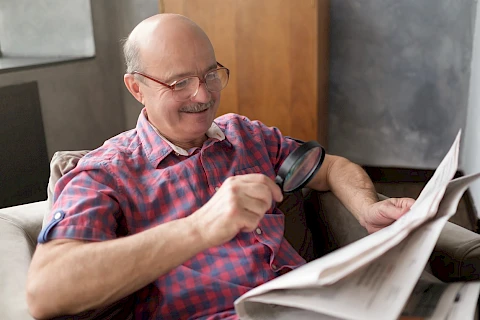
Does your elderly loved one need help with their vision? Sight impairments are common among seniors and can affect their daily activities and independence. Common conditions include macular degeneration, glaucoma, cataracts, and diabetic retinopathy. These conditions can make reading, cooking, and recognizing faces difficult. Understanding these impairments is the first step in selecting appropriate assistive technologies. Using adaptive tools can greatly enhance seniors' self-esteem and autonomy.
Types of Assistive Technologies for Vision Impairments
Here are a few vision aids that help seniors live more independent, enjoyable, and engaged lives.
Magnifying Devices
Magnifying devices are helpful tools that enlarge text and images, making them easier to see. Popular options include:
- Handheld Magnifiers: Simple and affordable, they are ideal for reading books or labels.
- Stand Magnifiers: Useful for reading or crafting, using a stable base for hands-free use.
- Electronic Magnifiers: These devices offer higher magnification and contrast settings but are generally more expensive.
"Talking" Watches
Talking watches are another excellent assistive technology for seniors with vision impairments. They audibly announce the time at the press of a button, making them extremely user-friendly. Talking watches help seniors keep track of appointments and medication schedules.
Screen-Reading Software
Screen-reading software is designed to help those with vision impairments use computers and smartphones. These programs read aloud the text on the screen and provide voice commands to navigate. Key features to look for include:
- Voice Clarity: Clear and natural-sounding speech.
- Compatibility: Works with websites and commonly used applications.
- Customization: Options to adjust the reading speed and voice.
Selecting the Right Device
Choosing the right assistive technology requires a personalized assessment. Mild vision loss may need simple magnifiers, while severe loss might need advanced aids. Determine what tasks the senior struggles with the most, like reading or checking the time.
It's also important to consider the preferences and comfort of the senior. Ensure the device is easy to operate and understand, and include the senior in the selection process to ensure the device meets their preferences and comfort level.
Getting Acquainted With The Device
After selecting an assistive technology, it's crucial to set it up correctly and provide thorough training. Read the manual to understand the device's features and functions. Walk through the basic operations with the senior, and encourage them to practice to become comfortable with the device.
Keep your manual where the senior can refer to it as needed. Most manuals include troubleshooting guides that may be useful in the future.
Help Is Within Sight
Assistive technologies can profoundly impact the lives of seniors by enhancing their independence and quality of life. By carefully selecting the right devices and providing the necessary training and support, caregivers can help seniors navigate their daily challenges more easily.
Assistive care is another means of prolonging your loved one's independence. If you're caring for a senior in the Newcastle, Rio Oso, Sheridan, Wheatland, or Marysville areas, contact us at Senior Helpers Lincoln, Yuba City for personalized assistance and support.